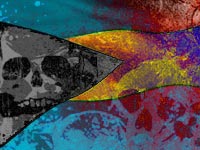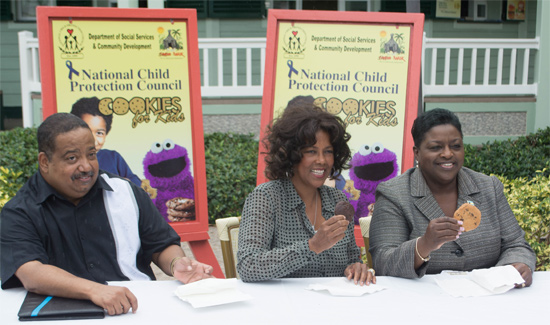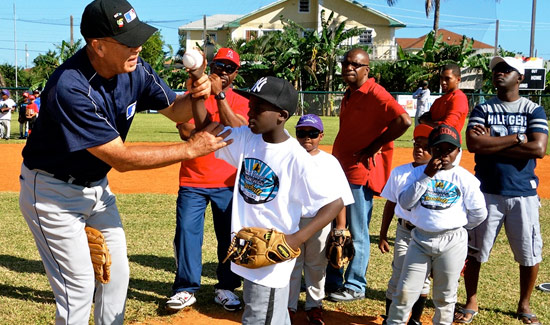“What happened to these masses, to this people? For forty years it had been driven through the desert, with threats and promises, with imaginary terrors and imaginary rewards. But where was the Promised Land?”
– Arthur Koestler, Darkness at Noon
The pervasive sunshine for which this country is known casts deep shadows where over the years, poisonous secrets have accumulated.
So accustomed are we to our description in the vacation brochures – a welcoming, exuberant, God-fearing people – that even we have come to mistake this mask for our own face.
 But under its official, picture-postcard skin, the Bahamas has a troubled soul.
But under its official, picture-postcard skin, the Bahamas has a troubled soul.
It has become a place filled with pain, rage and despair. A place where the sunlight blankets the surface but does not penetrate.
And who are the people who live in these shadows?
They are the fatherless young and the mothers of dead children. Victims of sexual predation and hostages in their own homes.
They are participants in unspeakable acts, in a constant struggle to live with themselves.
People who spend their whole lives paying for mistakes they were never equipped to avoid.
They are the wrongfully condemned and the zealous executioners. The murderers and the next of kin.
If you don’t know what I’m talking about, it means you are one of the privileged few.
Thanks to wealth, status or just plain luck, so far you’ve been spared contact with the tide of destructive social forces that is shaping the modern Bahamas.
But it also means you’re in the minority, out of touch with where this country is really headed.
The unwelcome truth is that 40 years after Independence, we find ourselves farther than ever from the Promised Land which was promised to us then.
And, what do we really have to show for it but an arsenal of superficial explanations, skilful deflections and short-term remedies?
But under its official, picture-postcard skin, the Bahamas has a troubled soul.
Very few are willing to soil their hands tugging at the roots of our deterioration; willing to remove the mask and look the truth in the face.
One such is Dr David Allen, for whom brutal honesty is a necessary ingredient in a workable solution.
The Bahamas, he says, is being taken over by an “ominous and pervasive culture of violence and destruction”.
Reporting on the findings of his research in 2010, he said: “We found a powerful sense of anger amongst us Bahamians. Throughout the three-year study participants talked about ‘outting’, which was the word for killing; poisoning – women particularly – and suicide.
“A few months ago we had a young girl commit suicide. We have five of her friends who want to do the same thing right now.
“Bahamians are saying I don’t feel the murders anymore; it’s just what is supposed to happen. They build a wall in their heart.
“In a group of 10 to 15 year olds, they don’t expect to live long. As a result (they think), you do what you can, get as much money, and then if you get killed or kill somebody, that’s it.
“Most disturbing is we found a number of young girls who had no compunction about giving their bodies for money. They pay for their education, but they also pay for their parents’ air conditioning, refrigeration and also their cable.
“The point is they had no feeling about it. They said, ‘Doc, that is what you call survival in the Bahamas.’ That was very, very disturbing.”
For Dr Allen, the difficult economic circumstances of the last few years did not beget an upsurge in crime and violence, as politicians like to claim.
Rather, material hardship unleashed forces that have been building in the shadows for more than three decades.
These forces were born and nurtured during the drug crisis of the 1980s, when more than two-thirds of the cocaine that made its way into the United States passed through the Bahamas, leaving in its wake a multitude of hopeless addicts and converts to the cult of easy money.
The toxins have been in our system ever since, slowly poisoning our sociocultural values, giving rise to ever more destructive behaviours and adding to the tally of silent victims.
The result is that the most fundamental characteristic of the modern Bahamas, the thing that really makes it tick, isn’t tradition, ambition, or national pride as we like to pretend, but rather shame.
We have become, Dr Allen says, a shame-based society, and the things we love to condemn in our neighbour – dishonesty, callousness, aggression – turn out to be necessary consequences of this fact.
Shame, he explains, is caused by “impacted hurt” – pain that has been trapped or blocked from being worked out along its natural course. Abuse that is swept into the corner, neglect that is hidden away.
“The shame response to this kind of hurt leads to self worthlessness, helplessness, hopelessness – depression and feelings of victimisation,” he says.
“We defend from intolerable shame through anger and a false self that is concerned with self absorption, ego gratification, revenge and aggressive control.
“This ultimately manifests as passive or overt aggression, and finally violence.”
He notes that nearly every person he interviewed who was involved in a serious crime had suffered some severe form of physical or sexual abuse.
One of his colleagues added that shame is “like a hot potato” – impossible to hold for long, hefted onto someone else at the earliest opportunity in an effort to seek temporary relief. And so the cycle of shame and violence is perpetuated exponentially.
If acts such as murder and suicide are not events but rather processes, it follows that to end the cycle of violence we must interrupt its progression before it manifests itself in action.
But if this is right, our after-the-fact, retribution based approach to justice is probably doing more harm than good – injecting even more anger and incentive for revenge into the cycle.
The same goes for efforts to stem the destructive tide with job creation, funding grants, and training programmes.
These are all helpful to an extent, but economics alone can’t heal shame.
Simply throwing money at the problem often does nothing but fuel a shortsighted and corrosive consumerism which itself arose as a strategy to conceal shame.
“Love is the antidote to shame,” Dr Allen says. “If we can apply love to the hurt, then we melt shame and stop the cycle of murderous rage and violence.”
His ground-breaking strategy for doing so, “The Family”, is named after what he believes was one of the most calamitous casualties of the drug years – the stable two-parent household.
The group has been running for six years and now has around 60 adult members, the majority of whom simply walked in one day feeling compelled to unburden themselves of the pain that was threatening to consume them.
A guest at their weekly meeting last Wednesday, I was profoundly moved not just by their testimonies of suffering, but also the disarming atmosphere of openness and honesty.
In a culture that has become dominated by self-denial, where everyone wears a disguise, I witnessed people giving voice for the first time to deep anxieties, profound hurt, closely held secrets.
And I watched them being welcomed with sympathy and understanding into a group of fellow travellers; into an organically developing support system in which positive emotions like gratitude and benevolence can flourish; into a Family.
The group is at once a microcosm of the problem – the full range of torments that afflict our people is represented – and a testament to the solution.
Dr Allen’s impressive results speak for themselves. But the programme as it stands is far too small to hold back the tide on its own.
So the real question is, do the rest of us have the courage to support his efforts?
Are we capable of facing up to what we’ve become, or will we continue to pretend that all’s well in the land of sun and sea, hoping thereby to attract sufficient tourist dollars to paper over the cracks?
What do you think?
By Paco Nunez
The Tribune


